Ray Comfort's Blog, page 37
April 3, 2012
It was efficient, professional and fast.
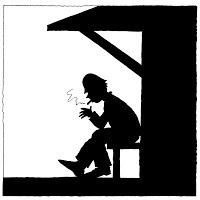 Two armed guards sat casually in the outpost. One lit up a cigarette and puffed on it in the coldness of the night air. Just then there was the sound of a limping car coming around a corner. It was the women. They were precisely on time. As the car hobbled towards them, one of the soldiers put out his cigarette, took a firm hold of his weapon and cautiously walked towards the vehicle. Jerry heard him tell the Camile to turn off the car lights. She immediately did so. He then directed the other guard to shine a spotlight into the car and then directly at the women. Both men liked what they saw. He then told them to get out of the car and to slowly walk towards them.
Two armed guards sat casually in the outpost. One lit up a cigarette and puffed on it in the coldness of the night air. Just then there was the sound of a limping car coming around a corner. It was the women. They were precisely on time. As the car hobbled towards them, one of the soldiers put out his cigarette, took a firm hold of his weapon and cautiously walked towards the vehicle. Jerry heard him tell the Camile to turn off the car lights. She immediately did so. He then directed the other guard to shine a spotlight into the car and then directly at the women. Both men liked what they saw. He then told them to get out of the car and to slowly walk towards them.It was when Camile said something about giving the soldiers a "good time" that both soldiers let their guards down. It was only for a moment, but it was obvious that her words diffused the air of its tension. Their body-language changed. The weapons in their hands were no longer held high. That was all that was needed. Within seconds, both soldiers were seized from behind, had their throats cut and their corpses were quickly dragged into the bushes. It was efficient, professional and fast.
To be continued.
For Evangelism Resources, please visit LivingWaters.com.
Published on April 03, 2012 06:15
April 2, 2012
For the free world...
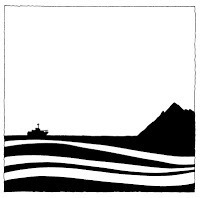 Thanks to Resistance expertise in travel documentation and a willing French fisherman and his sturdy vessel, it wasn't long before the two men were on the Island of Corsica. Jerry felt as though he had already been there, especially after he was given a crash course of the island and its history during the one hundred mile boat trip. It was the birthplace of Napoleon, was strikingly beautiful and was the fourth largest island in the Mediterranean. Simply put, the island looked like a mountain range jutting out of the sea. It was covered with hills and steep mountains, except for the eastern side of the island, which was primarily a coastal plain. That's where they had decided to land the fishing vessel.
Thanks to Resistance expertise in travel documentation and a willing French fisherman and his sturdy vessel, it wasn't long before the two men were on the Island of Corsica. Jerry felt as though he had already been there, especially after he was given a crash course of the island and its history during the one hundred mile boat trip. It was the birthplace of Napoleon, was strikingly beautiful and was the fourth largest island in the Mediterranean. Simply put, the island looked like a mountain range jutting out of the sea. It was covered with hills and steep mountains, except for the eastern side of the island, which was primarily a coastal plain. That's where they had decided to land the fishing vessel. After landing, the two men quickly made contact with the local Resistance who informed them that the Nazis had closed a vital link between two parts of the Island. Their first mission was given to them within minutes of their arrival. They were to take out a guard post not too far from where they landed. They would have the invaluable help of two attractive female members of the Resistance who lived on that part of the Island.
For nearly an hour, the two men and the two women rehearsed the attack. Camile and Simone would let down the back tire of their car. They would also let down their hair and let down their blouses over their shoulders, so that they would look like a couple of loose women. They told both of the men that they hated doing this, because they were church-going women. One of them quoted the words of Solomon--something about a man being brought "to a piece of bread" by a "whorish woman." In other words, when a loose woman tempts a man, he has little or no resistance. They were counting on the truth of this verse.
Simone said that when her younger sister raped by a young German soldier, a Nazi doctor had aborted the pregnancy. It was a nightmare for her sister and she would never be the same. Another friend, who refused to become a "call girl" for the soldiers, was raped and then shot through the head by the soldier that raped her. He said that her sister had tried to kill him and that it was self-defense. There was no official inquiry about the incident.As Jerry waited in the bushes, his heart pounded as hard as it did when he hid under the floor of the bakery in Bialystock. He never found killing another human being to be easy. He had to become detached--like a killing-machine. He dare not let his fears, or his emotions, let him think about what he was doing. He just did it. He did it for France. He did it for the free world...for his father.
To be continued.
For Evangelism Resources, please visit LivingWaters.com.
Published on April 02, 2012 06:15
March 30, 2012
Island of Corsica
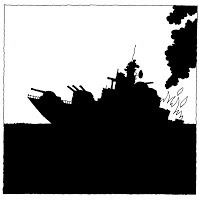 Jerry soberly read an underground newspaper out loud to Charles, his newfound friend and fellow fighter. It was a confirmation to rumors they had heard about naval commanders in the South of France. When an order came to sink their own ships before the Nazis fully occupied the country, they didn't hesitate to do so.
Jerry soberly read an underground newspaper out loud to Charles, his newfound friend and fellow fighter. It was a confirmation to rumors they had heard about naval commanders in the South of France. When an order came to sink their own ships before the Nazis fully occupied the country, they didn't hesitate to do so."November 27th, 1942. At the break of dawn Admiral de Laborde gave orders to scuttle the ships as soon as the Nazis entered the town of Toulon, so that the vessels couldn't fall into the enemy's hands. Most of the French navy's biggest ships had taken refuge in the Toulon harbor. Witnesses said that many of the captains stayed on the bridge of their ships until they had sunk beneath the waves. Others even went down with their ships. Many crewmen stood on the docks and watched as flames engulfed their ships. Some wept. Others saluted. A quarter of a million tons of shipping were sunk, including the battleships Dunkirk, Provence and Strasbourg, seven cruisers and 12 submarines."
His friend Charles was a typical French freedom fighter. He loved wine, and he loved women even more. He loved to sing, and he loved liberty. He had taken all these things for granted up until the German occupation. He lost his brother and father on the Island of Corsica a year earlier in a bombing raid, and yet the tragedies that had come his way hadn't taken from him his love of life. Instead, they had hardened his resolve to fight oppression.
Soon after the first bombing raid that killed his father and brother, the Nazis arrived on the island in force. Charles had been torn between staying with the remaining members of his family or joining the Resistance. If he stayed in Corsica he risked being shot. It was because of this that his mother and sister pleaded with him to leave the island and fight on the Mainland for his country. He escaped the Island in a fishing boat with three others, and shortly after made contact with the Resistance.
Like many others, years of fighting had taken a gentle fisherman and hardened him to the realities of war. He had stabbed, shot, poisoned, and he had even strangled Nazis with his bare hands.
It wasn't long until the local Resistance began its work on Corsica. They saw their mandate was to do anything that would frustrate, confuse or hinder the enemy. This entailed the carrying out of full-scale attacks on convoys, to simply cutting communication wires.
Charles had often spoken to Jerry about his happy and carefree childhood. That's why it didn't surprise Jerry when he decided to go back to the island. He said that it was his prayer that when the Nazis began retreating, Corsica would be their fist backward step. What surprised Jerry was his insistence that he go back with him. It didn't take long for him to come to a decision.
To be continued.
For Evangelism Resources, please visit LivingWaters.com.
Published on March 30, 2012 06:15
March 29, 2012
Chapter Seven: The Secret Room
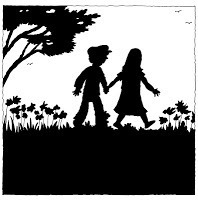 After the death of Jean and the disappearance of Lilian, Jerry became disheartened and decided that he would move out of the city into the country. He needed a break from his work for the liberation of France.
After the death of Jean and the disappearance of Lilian, Jerry became disheartened and decided that he would move out of the city into the country. He needed a break from his work for the liberation of France.The place he chose to move to was the small village of Oradour‑sur‑Glane. Despite the occupation, it was remarkably free from the concentration of soldiers that were in Paris. There, he met a soft‑spoken French girl named Monique. She reminded him of Lilian because of her passion to liberate France from the Germans. As the days went by, he found himself loving her, as he had never loved before. She seemed to kindle the fire back in his heart to stand up against the Germans. When it was possible, they would sneak away and go for long walks and he would tell her of his childhood in Texas. She even convinced him to visit the small church in the village on Sundays.
After living in Oradour for three months, thanks to Monique he fully regained his passion to rid France of the Nazis. He therefore decided that he would return to Paris to keep in contact with the Resistance in the city.
On his return from Paris three days later, to his horror he found that the Germans had killed every person they could find in the tiny village of Oradour. A total of 642 people had been slaughtered, including Monique. The Nazis were avenging the capture of an SS officer by the Resistance. An unconfirmed rumor said he was executed in Oradour.
A witness said the SS encircled the village, divided the men into five or six groups, and then herded them into barns. The women and children were locked in the church building. The men were shot first, then the churches were set on fire. When the women and children tried to escape, they were shot dead. At 6:00 that evening the Germans stopped a train, arrested and shot all those who were heading for Oradour.
News of this sickened Jerry beyond words. It was as though the bitterness of life had struck a deathblow to his very soul. He withdrew into a deep anger both at the Nazis, and at God who had allowed them to cause such suffering.
When he went back to Paris, he heard through the BBC, that in Rome the Gestapo had indiscriminately arrested two Italian priests, a number of Jews, some women and two 14‑year old boys, and mercilessly shot them to death. They were killed in reprisal for a bomb attack that had slain 33 German policemen. Hitler had demanded that 50 Italians be executed for each German that died, but German officials in Italy reduced the ratio.
To be continued.
For Evangelism Resources, please visit LivingWaters.com.
Published on March 29, 2012 06:15
March 28, 2012
Tortured
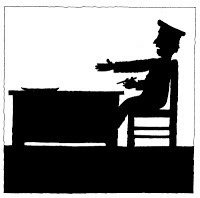 The officer walked back around his desk and sat down. Then he said, "At this present moment, we have your wife and two little girls in the hands of the SS in Barletta. If you simply write the address of Jean Moulin on this piece of paper, we will immediately take them back to their home. However, if you fail to cooperate with us, we will be forced to let the SS execute them. Your wife will be questioned and then hanged, and your two children drowned. Then we will torture you until you tell us what we want to know . . . and you will tell us everything, believe me.
The officer walked back around his desk and sat down. Then he said, "At this present moment, we have your wife and two little girls in the hands of the SS in Barletta. If you simply write the address of Jean Moulin on this piece of paper, we will immediately take them back to their home. However, if you fail to cooperate with us, we will be forced to let the SS execute them. Your wife will be questioned and then hanged, and your two children drowned. Then we will torture you until you tell us what we want to know . . . and you will tell us everything, believe me."However, if you do decide to be sensible and help us, we will drive you to Italy to be reunited with your family. You have until noon to make up your mind what you will do." He then stood up from his desk and left the room.
Andre's head spun with confusion. It was as though his whole life suddenly came crashing in on him. If he cooperated, he would be a traitor to his country, and if he didn't . . . He leaned forward and thumped the desk in anger.
For three hours Andre wrestled with his options. He wept aloud. He cursed. He prayed. He contemplated suicide by smashing the glass from the barred window high above the officer's desk and cutting his wrists. But what good would that do? They would see that as a refusal to cooperate and kill his family anyway.
When the SS officer entered the room, Andre was bent double with his head in his hands. He took Andre's right hand and put a pencil in it. He looked at the Nazi with utter disdain, then down at the blank piece of paper on the desk in front of him. He leaned forward and with a trembling hand wrote an address on the paper.
On July 8, 1943, the Germans announced that Jean Moulin, the leader of the French Resistance had died. He had been tortured for a month. He was 44.
Lilian had been with Jean the night he was arrested. There were rumors that she had also been tortured then sent to Auschwitz.
To be continue.
For Evangelism Resources, please visit LivingWaters.com.
Published on March 28, 2012 06:20
March 27, 2012
The man is insane!
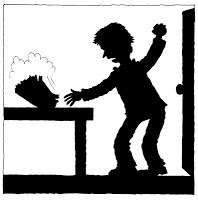 There was a sudden and special knock on the door at the Resistance hideout. It was Henri. He was holding a newspaper in his hands as he stepped into the room. He lifted his arms up in despair in typical French fashion, and with a look of disgust threw the newspaper onto the wooden table and said,
There was a sudden and special knock on the door at the Resistance hideout. It was Henri. He was holding a newspaper in his hands as he stepped into the room. He lifted his arms up in despair in typical French fashion, and with a look of disgust threw the newspaper onto the wooden table and said,"I don't believe it! I don't believe it! The man is insane!"
By now both Lilian and Jerry could understand French, even when it was uttered with such passion. Jean picked the newspaper up and whispered something unrepeatable. The article he saw read:
"At 3:00 this morning, thousands of French police officers fanned out through Paris on an unprecedented mission. They rounded up Jews, 13,000 of them, shoved them into buses and locked them up in the sports facility known as the Winter Velodrome. Among the people cowering beneath the bleachers are invalids, pregnant women and more than 3,000 children. The round up was part of an agreement Vichy's Pierre Laval made with the Nazis. The Germans agreed not to deport any French Jews to Germany if the French arrested foreign Jews. Laval claims he can save 75,000 lives. Critics say that he has bartered with the devil."
Some time later, a news report filtered back from Warsaw about the "new life" the Jews were getting in the ghettos in Poland. Over 60,000 were resisting the Nazis. A year earlier there were 500,000, but many were killed or dragged to the Concentration Camps. SS troops under the command of General Jurgen Stroop attacked the walled ghetto on April 19, 1943, with orders to arrest the remainder. When they entered the area, they began searching it systematically, block by block, house to house, basement to ceiling. When there was resistance, the SS opened fire with tanks, mortars and machineguns or they torched the homes with flame-throwers.
Word filtered back to the ghettos about what happened to Jews who were taken to the Concentration Camps, yet they had nowhere to hide.
Jewish resistance fighters, who were able to keep one step ahead of the Nazis, returned to Warsaw with stories from the ghetto at Lubin. From their apartment windows, Jews could see the fearful sight of the barbed wire of the Maidanek Concentration Camp, and they could also see the smoke rising from the large crematoriums.
Reports leaked back around the middle of May 1943, that there were no more Jews left in the Warsaw ghetto. Jurgen Stroop, the SS General said that his troops killed a total of 56,065 Jews, but not all of that number died from Nazi bullets. Many committed suicide by staying in their burning homes. Others jumped from their roofs.
Around that time, Andre, one of the trusted members of the Resistance disappeared. After making extensive inquiries, Jean concluded that the Nazis had captured and shot him. Little did he know that something worse had happened.
As Andre was leaving his home, he was stopped by two members of the SS, arrested and taken by car to the outskirts of Paris. There he was ushered into a small room of a large, block church building. The room contained two high‑ranking Nazi officers and the stale smell of cigar smoke.
He was told to sit down in a chair in front of a large desk. Then through an interpreter, he was informed that they had proof that he was a member of the French Underground, and they would let him go if he would merely give the address of Jean Moulin. Andre forced a smile and said he would never betray the Resistance.
It was then that the officer stood up, walked around and sat casually on his desk. He was holding two large photographs. He stared at them and said in broken French, "Oh, I think you will." He looked directly at the Frenchman, then handed him the prints.
Andre's heart sank as he stared at the pictures. They were of his beloved wife and his two young daughters. Jean had bent the rules and allowed Andre to join the Resistance only on the condition that he would send his wife and children out of the country. He was fearful that if any of its members had families, they would die by the hands of Nazis. Andre had made the mistake of sending his beloved family to what he thought was a secret location in southern Italy.
To be continued.
For Evangelism Resources, please visit LivingWaters.com.
Published on March 27, 2012 06:15
March 26, 2012
Nazis were efficient
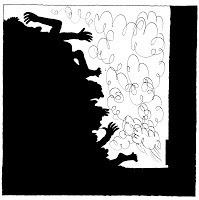 The underground paper reported that Auschwitz Concentration Camp had killed more than a million people. Once again, the Nazis were efficient. Once the chamber was full, the doors were screwed shut and solid pellets of Zyklon-B were dropped into the chambers through vents in the side walls, releasing toxic HCN, or hydrogen cyanide. Those inside died within 20 minutes; the speed of death depended on how close the inmate was standing to a gas vent, according to Rudolf Hoess, who estimated that about one third of the victims died immediately. Joann Kremer, an SS doctor who oversaw the gassings, testified that: "Shouting and screaming of the victims could be heard through the opening and it was clear that they fought for their lives. When they were removed, if the chamber had been very congested, as they often were, the victims were found half-squatting, their skin colored pink with red and green spots, some foaming at the mouth or bleeding from the ears.
The underground paper reported that Auschwitz Concentration Camp had killed more than a million people. Once again, the Nazis were efficient. Once the chamber was full, the doors were screwed shut and solid pellets of Zyklon-B were dropped into the chambers through vents in the side walls, releasing toxic HCN, or hydrogen cyanide. Those inside died within 20 minutes; the speed of death depended on how close the inmate was standing to a gas vent, according to Rudolf Hoess, who estimated that about one third of the victims died immediately. Joann Kremer, an SS doctor who oversaw the gassings, testified that: "Shouting and screaming of the victims could be heard through the opening and it was clear that they fought for their lives. When they were removed, if the chamber had been very congested, as they often were, the victims were found half-squatting, their skin colored pink with red and green spots, some foaming at the mouth or bleeding from the ears.The gas was then pumped out, and the dead bodies were removed (which could take up to four hours). Gold fillings were then pulled from the teeth with pliers by the prisoners who were dentists, and the hair was cut from the heads of the women. The hair was then sent to factories, where it was woven into special fittings for gaskets.
The floors of the chamber was then cleaned its walls were whitewashed. This work was done by Jews who hoped to live a few extra months of life. When these prisoners had dealt with the dead bodies, the SS conducted a close inspection to ensure that all the gold had been taken from the teeth of the corpses. If the inspection found that any gold had been missed, the prisoner responsible was thrown into the furnace alive as punishment.
One Nazi who had been taken captive said,
"Another improvement we made over Treblinka was that we built our gas chambers to accommodate 2,000 people at one time,….The way we selected our victims was as follows: we had two SS doctors on duty at Auschwitz to examine the incoming transports of prisoners. The prisoners would be marched by one of the doctors who would make spot decisions as they walked by. Those who were fit for work were sent into the Camp. Others were sent immediately to the extermination plants. Children of tender years were invariably exterminated, since by reason of their youth they were unable to work. Still another improvement we made over Treblinka was that at Treblinka the victims almost always knew that they were to be exterminated and at Auschwitz we endeavored to fool the victims into thinking that they were to go through a delousing process. Of course, frequently they realized our true intentions and we sometimes had riots and difficulties due to that fact. Very frequently women would hide their children under the clothes but of course when we found them we would send the children in to be exterminated. We were required to carry out these exterminations in secrecy but of course the foul and nauseating stench from the continuous burning of bodies permeated the entire area and all of the people living in the surrounding communities knew that exterminations were going on at Auschwitz."
To be continued.
For Evangelism Resources, please visit LivingWaters.com.
Published on March 26, 2012 06:15
March 23, 2012
'Fill in the pits.'
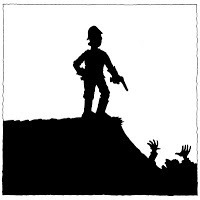 The task of the mass killings of Jews in the Soviet territories was given to SS formations called Einsatzgruppen ("Task-groups"). These had been previously used on a smaller scale in 1939 in Poland. One of the underground newspapers obtained a statement from a witness of a mass-killing that took the life of 1,600 Jews:
The task of the mass killings of Jews in the Soviet territories was given to SS formations called Einsatzgruppen ("Task-groups"). These had been previously used on a smaller scale in 1939 in Poland. One of the underground newspapers obtained a statement from a witness of a mass-killing that took the life of 1,600 Jews:"I saw them do the killing. At 5:00 p.m. they gave the command, 'Fill in the pits.' Screams and groans were coming from the pits. Suddenly I saw my neighbor Ruderman rise from under the soil … His eyes were bloody and he was screaming: 'Finish me off!' … A murdered woman lay at my feet. A boy of five years crawled out from under her body and began to scream desperately. 'Mommy!' That was all I saw, since I fell unconscious."
The paper also reported that on September 29–30, 1941 in a ravine outside Kiev, 33,771 Jews were killed in a single operation. The large crowd was gathered by the local cemetery and expected that they would be loaded onto trains. Suddenly they heard machine-gun fire. There was no chance to escape. They were all herded down a corridor of soldiers, in groups of ten, and then shot. A truck driver described the scene:
"One after the other, they had to remove their luggage, then their coats, shoes, and over-garments and also underwear … Once undressed, they were led into the ravine which was about 150 meters long and 30 meters wide and a good 15 meters deep … When they reached the bottom of the ravine they were seized by members of the Schutzpolizei and made to lie down on top of Jews who had already been shot … The corpses were literally in layers. A police marksman came along and shot each Jew in the neck with a submachine gun … I saw these marksmen stand on layers of corpses and shoot one after the other … The marksman would walk across the bodies of the executed Jews to the next Jew, who had meanwhile lain down, and shoot him."
"At the extermination camps that had gas chambers all the prisoners arrived by freight trains. At times all the passengers were sent directly to gas chambers, but more than often the camp doctor inspected them and some were deemed fit enough to work in the slave labor camps. The rest were moved from the train station platforms to an area where they were stripped of their clothes and possessions. These were seized by the Nazis to continue to assist is funding the war. Then they were herded naked into the gas chambers, usually being told that they were about to be showered or deloused. There were even signs outside that hung outside saying 'baths' and 'sauna.' To keep them from panicking and causing problems they were sometimes issued with a small piece of soap and a towel, and told to remember where they had left their belongings. When they pleaded for water after their long journey in the cattle trains, they were informed to move along quickly because there was a cup of coffee waiting for them in the camp, and it was getting cold."
To be continued.
For Evangelism Resources, please visit LivingWaters.com.
Published on March 23, 2012 03:15
March 22, 2012
Invasion
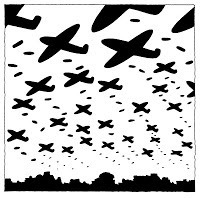 Two years had passed. It was July 16, 1942. Britain had been bombed by Nazi air attacks, and at one time an incredible 60,000 buildings were destroyed by the assaults. In Warsaw, the Germans herded the Jewish population behind an eight‑foot wall enclosing the city's ghetto district. The Nazis said they did so to give the Jews a "new life," in what they called "Family Camps." All Jews were ordered to wear a six‑point Star of David outlined with the word "Jew," which was to be "worn visibly and firmly stitched to the left breast of the clothing."
Two years had passed. It was July 16, 1942. Britain had been bombed by Nazi air attacks, and at one time an incredible 60,000 buildings were destroyed by the assaults. In Warsaw, the Germans herded the Jewish population behind an eight‑foot wall enclosing the city's ghetto district. The Nazis said they did so to give the Jews a "new life," in what they called "Family Camps." All Jews were ordered to wear a six‑point Star of David outlined with the word "Jew," which was to be "worn visibly and firmly stitched to the left breast of the clothing."Meanwhile, Hitler invaded and conquered Yugoslavia after a massive bombing attack. Then, in what was seen as an insane move, he attacked his own ally--Russia, and encircled Leningrad, planning to starve the city to death. The United States finally joined the war after the Japanese devastated Pearl Harbor in Hawaii with a 360‑plane surprise attack. The attack happened on December 7, 1941 and although a surprise aerial attack was extremely successful, Japanese submarines failed to finish off any wounded ship inside the harbor. They had deceived the U.S. by expressing interest in continued peace. However, the success of the attack, which came under the command of Admiral Nagumo, surprised the Japanese as much as the Americans. Their force consisted of six carriers with 423 planes, and killed 2,335 servicemen and 68 civilians, with 1178 wounded. President Franklin D. Roosevelt said, "December 7, 1941, a date which will live in infamy," in reference to the attack. The following day, Congress declared war on Japan with only one vote against it. The vote against it was of Representative Jeannette Rankin of Montana, who had also voted against U.S. entry into World War I. For Jerry, Pearl Harbor was bitter-sweet. News filtered back that Jews were being slaughtered in mass in the dreaded Concentration Camps, something known as "the final solution." Hitler said that it was the only fate deserved by the "Untermenschen, "‑‑the sub‑humans.
German physicians carried out cruel experiments on those held in many Concentration Camps. One of these "doctors" was in the infamous Josef Mengele, who worked in Auschwitz. His experiments included putting victims in pressure chambers, testing drugs on them, freezing them, attempting to change their eye colors by injecting chemicals into children's eyes and various amputations and other brutal surgeries. Those who managed to survive his horrific experiments were almost always killed and dissected shortly afterwards.
Mengele liked to experiment with Gypsy children. Vera Alexander was a Jewish inmate at Auschwitz who looked after 50 sets of Romani twins. She recalled:
"I remember one set of twins in particular: Guido and Ina, aged about four. One day, Mengele took them away. When they returned, they were in a terrible state: they had been sewn together, back to back, like Siamese twins. Their wounds were infected and oozing pus. They screamed day and night. Then their parents – I remember the mother's name was Stella – managed to get some morphine and they killed the children in order to end their suffering."
To be continued.
For Evangelism Resources, please visit LivingWaters.com.
Published on March 22, 2012 06:15
March 21, 2012
Chapter Six: Family Camps
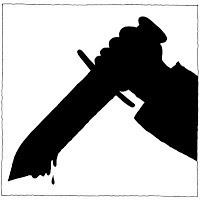 Jean Moulin, the French underground leader looked directly at Jerry and asked,
Jean Moulin, the French underground leader looked directly at Jerry and asked,"Why aren't the Americans helping us?" Jerry also felt impatient with the reticence of the U.S. to fight alongside the Allies. He could feel Jean's frustration. He said,
"With the fall of France we had hoped that Roosevelt would drop his policy of isolationism. Many back home are feeling very nervous about what's happening in Europe. I don't know what will have to happen to bring the United States into the war, but whatever it takes, I hope it will come quickly." Jean's question came in the light of the fact that Italy's Premier Mussolini united his country with Germany against Britain and France. The BBC aired parts of a speech by President Roosevelt in which he said,
"The hand that held the dagger has struck it into the back of its neighbor."
Jean gave a brave smile, put a fatherly arm around Lilian and said,
"Still, it's so good to have you two with us." Once the Resistance realized that they could trust Lilian, they welcomed her brother.
Jean was a kind and courageous man. Earlier that month the Germans arrested him for refusing to sign a statement blaming Senegalese soldiers for murders committed by the Germans. A German soldier had scribbled a note to him while he was in prison saying,
"I compliment you on the energy with which you defend your country's honor." He had also been instrumental in uniting the Resistance-fighters in the North and the South.
Lilian looked up at him and said,
"I had given up hope of you ever contacting me. I didn't think you trusted me." Jean smiled and said,
"We didn't. We tailed you for a week. We also checked up on where you came from. The fact is, we seldom allow anyone to join the underground if they don't come with a concrete personal recommendation."
He looked at Jerry and smiled warmly.
"Your sister's word was good enough for us to trust you. We are very pleased to have a small part of America with us."
That night about a dozen members of the Resistance sat and listened to General Charles de Gaulle. He was speaking from London on the BBC. He said,
"Whatever happens, the flame of the French Resistance must not go out, and it will not go out."
To be continued.
For Evangelism Resources, please visit LivingWaters.com.
Published on March 21, 2012 06:15
Ray Comfort's Blog
- Ray Comfort's profile
- 397 followers
Ray Comfort isn't a Goodreads Author
(yet),
but they
do have a blog,
so here are some recent posts imported from
their feed.



